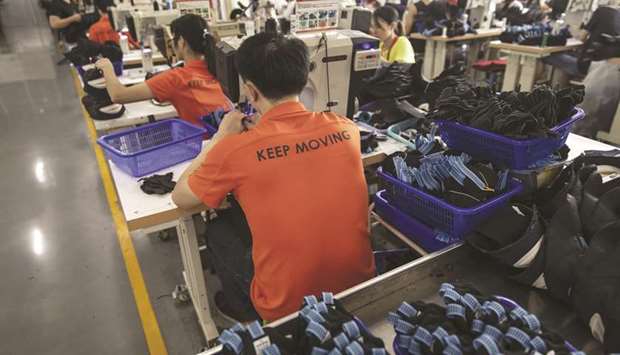China faces its worst job market in more than two decades, with tens of millions of people temporarily without work or unemployed in the first three months of 2020 and the number of jobs set to shrink by more than 10mn this year, according to UBS Group AG economists.
About 70mn-80mn people in services, manufacturing and construction either had lost jobs or weren’t working at the end of March because of shutdowns to contain coronavirus, according to Wang Tao and other economists at the bank.
“As economic activities normalise and with the help of policies supporting SMEs,” or small and medium-sized enterprises, “we expect these numbers to decline quickly and substantially in the coming quarters,” they wrote in a report to clients yesterday.
Still, the deterioration in the global economy is expected to hit demand for Chinese goods from April, which likely will mean job losses at manufacturers and exporters.
More than 10mn jobs are at risk, they wrote.
China’s gross domestic product will likely grow 1.5% this year, which implies the urban job market could contract by a few million, UBS estimated, instead of the net increase of 10mn or so new jobs seen in recent years.
UBS’ economic growth forecast for China this year is below the consensus of around 3%. Total net non-farm employment will decline by more than 10mn jobs, they estimate.
The weaker employment and income growth will weigh on consumption even as an easing of travel restrictions releases pent-up demand, they wrote, arguing that private consumption will “decline marginally” compared to last year.
The official unemployment rate jumped to 6.2% in February, the highest level since the data series began in 2016.
Wang’s team argued this may still underestimate the actual rate because it doesn’t capture the situation in small and rural firms, and many businesses hadn’t resumed work when the data was compiled.
A continued slump in the job market could prompt policy makers to resort to more aggressive stimulus measures, as the Chinese government has long said stable employment is the bottom line for the economy, and it can tolerate slower growth as long as the job market is fine. “As long as employment is stabilised this year, it’s no big deal if economic growth is a bit higher or lower,” Premier Li Keqiang said at a regular State Council meeting March 10.
People in services and construction were the hardest-hit group in the first quarter, while those in export-related industries will feel the pressure in coming quarters as external demand drops, UBS said, adding that the brunt of job losses will be concentrated in the private sector.

Workers operate sewing machines on the footwear production line at a sports goods factory in Jinjiang, Fujian. About 70mn-80mn people in services, manufacturing and construction sectors in China either lost jobs or weren’t working at the end of March because of shutdowns to contain coronavirus, economists at the UBS Group said.


